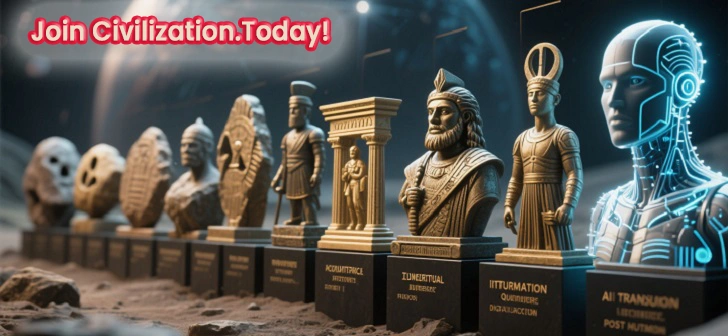When we talk about the most influential cultures in human history, the Ancient Greece civilization stands as a towering pillar. Known for its groundbreaking ideas, vibrant culture, and unmatched contributions to politics, art, and science, Ancient Greece shaped the foundations of Western civilization. From the bustling agora of Athens to the philosophical debates of Plato and Aristotle, this remarkable era gave us democracy, timeless wisdom, and innovations that still echo through our modern world.
In this article, we will explore how the Ancient Greece civilization nurtured philosophy, invented democracy, and pursued knowledge with a passion that changed the course of human history.
The Rise of the Ancient Greece Civilization
The Ancient Greece civilization thrived between the 8th century BCE and the 6th century CE. It was not a single unified empire, but rather a collection of independent city-states, or polis, each with its own government, culture, and military. Among the most famous were Athens, Sparta, Corinth, and Thebes.
Despite their political differences, these city-states shared a common language, religion, and cultural identity. This shared heritage laid the foundation for advancements in philosophy, governance, and science.
The Birthplace of Democracy
One of the greatest gifts the Ancient Greece civilization gave to the world is democracy. Athens, in particular, pioneered the concept of citizens having a direct say in governance. Around the 5th century BCE, under the leadership of figures like Cleisthenes and Pericles, Athens developed a political system where free male citizens could vote on laws and policies.
Unlike modern representative democracies, Athenian democracy was direct — citizens gathered in assemblies to debate and decide on issues themselves. This radical idea not only influenced political systems across Europe and America centuries later, but it also established the principle that government should be accountable to its people.
The Golden Age of Philosophy
The Ancient Greece civilization was the birthplace of some of the greatest minds in history. Greek philosophy sought to understand the universe, human nature, and the best way to live. This era gave rise to three legendary thinkers whose works continue to inspire:
- Socrates. Famous for the Socratic Method, he encouraged questioning everything to arrive at truth and wisdom.
- Plato. Founder of the Academy in Athens, he wrote The Republic, a vision of an ideal state.
- Aristotle. A student of Plato and tutor to Alexander the Great, he made significant contributions to logic, biology, ethics, and politics.
These philosophers emphasized reason, debate, and critical thinking — tools that have shaped modern science, ethics, and education.
Knowledge Beyond Borders: Science, Mathematics, and Arts
The Ancient Greece civilization was not just about politics and philosophy; it was also a hub of scientific and artistic achievement.
-
Science & Mathematics
Greek thinkers like Archimedes, Euclid, and Pythagoras made discoveries that became the building blocks of modern physics, geometry, and engineering. They studied the stars, measured the Earth, and even explored early ideas about atoms.
2. Literature & Drama
Greek poets such as Homer wrote epic tales like The Iliad and The Odyssey, while playwrights like Sophocles, Euripides, and Aristophanes produced dramas that explored love, power, war, and morality.
3. Architecture
Greek architecture — especially the majestic temples like the Parthenon — symbolized harmony, proportion, and beauty. The iconic Doric, Ionic, and Corinthian columns became timeless design elements.
The Olympic Games: A Legacy of Competition and Unity
The Ancient Greece civilization also birthed the Olympic Games in 776 BCE. Held in Olympia every four years, these games were both a celebration of physical strength and a religious festival honoring Zeus. Athletes from different city-states competed in events such as running, wrestling, discus, and chariot racing.
The spirit of friendly competition and unity in the face of political rivalries became one of Ancient Greece’s most enduring traditions, inspiring the modern Olympics we celebrate today.
Education and the Pursuit of Knowledge
In the Ancient Greece civilization, education was highly valued, especially in Athens. Boys from wealthy families were taught grammar, music, and physical training, while more advanced students studied philosophy, mathematics, and rhetoric.
Unlike some ancient cultures where knowledge was limited to priests or elites, Greece encouraged open discussion and debate. This culture of learning led to innovations that shaped everything from politics to medicine.
The Fall, But Not the End
The Ancient Greece civilization eventually declined due to internal conflicts, such as the Peloponnesian War between Athens and Sparta, and later invasions by Macedon and Rome. However, even after Greece became part of the Roman Empire, its culture, philosophy, and scientific knowledge continued to influence the world.
Roman scholars studied Greek works, Renaissance thinkers revived them, and today they remain cornerstones of education, politics, and art.
Why Ancient Greece Still Matters Today
The Ancient Greece civilization was not perfect — women, slaves, and non-citizens had limited rights, and wars between city-states were frequent. Yet, its achievements have left a legacy that continues to shape modern society:
- Politics. The foundation of democratic governance.
- Philosophy. The art of questioning and seeking truth.
- Science & Mathematics. The roots of rational inquiry.
- Arts & Literature. Timeless works of creativity and beauty.
Every time we vote, attend a university lecture, or admire a neoclassical building, we are experiencing the living legacy of Ancient Greece.
Conclusion: The Timeless Inspiration of Ancient Greece
The Ancient Greece civilization was a beacon of human achievement, a place where ideas flourished, and the pursuit of excellence was a way of life. From democracy to philosophy, from art to science, its contributions have shaped the path of humanity for over two millennia.
In a world constantly evolving with new technologies and challenges, the wisdom of Ancient Greece reminds us that progress begins with curiosity, dialogue, and a shared vision for the future.
Ancient Greece may have fallen, but its spirit lives on — in our laws, our arts, our schools, and in the very way we think about the world.



